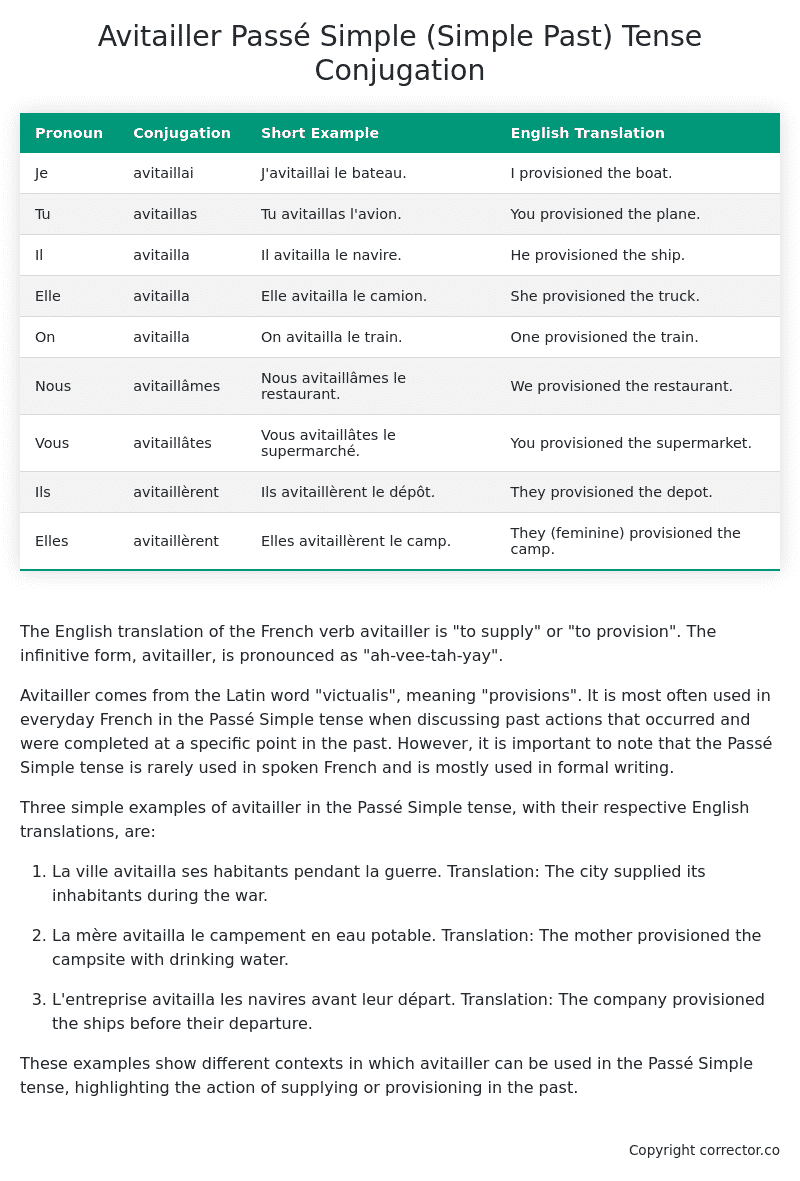Passé Simple (Simple Past) Tense Conjugation of the French Verb avitailler
Introduction to the verb avitailler
The English translation of the French verb avitailler is “to supply” or “to provision”. The infinitive form, avitailler, is pronounced as “ah-vee-tah-yay”.
Avitailler comes from the Latin word “victualis”, meaning “provisions”. It is most often used in everyday French in the Passé Simple tense when discussing past actions that occurred and were completed at a specific point in the past. However, it is important to note that the Passé Simple tense is rarely used in spoken French and is mostly used in formal writing.
Three simple examples of avitailler in the Passé Simple tense, with their respective English translations, are:
-
La ville avitailla ses habitants pendant la guerre.
Translation: The city supplied its inhabitants during the war. -
La mère avitailla le campement en eau potable.
Translation: The mother provisioned the campsite with drinking water. -
L’entreprise avitailla les navires avant leur départ.
Translation: The company provisioned the ships before their departure.
These examples show different contexts in which avitailler can be used in the Passé Simple tense, highlighting the action of supplying or provisioning in the past.
Table of the Passé Simple (Simple Past) Tense Conjugation of avitailler
| Pronoun | Conjugation | Short Example | English Translation |
|---|---|---|---|
| Je | avitaillai | J’avitaillai le bateau. | I provisioned the boat. |
| Tu | avitaillas | Tu avitaillas l’avion. | You provisioned the plane. |
| Il | avitailla | Il avitailla le navire. | He provisioned the ship. |
| Elle | avitailla | Elle avitailla le camion. | She provisioned the truck. |
| On | avitailla | On avitailla le train. | One provisioned the train. |
| Nous | avitaillâmes | Nous avitaillâmes le restaurant. | We provisioned the restaurant. |
| Vous | avitaillâtes | Vous avitaillâtes le supermarché. | You provisioned the supermarket. |
| Ils | avitaillèrent | Ils avitaillèrent le dépôt. | They provisioned the depot. |
| Elles | avitaillèrent | Elles avitaillèrent le camp. | They (feminine) provisioned the camp. |
Other Conjugations for Avitailler.
Le Present (Present Tense) Conjugation of the French Verb avitailler
Imparfait (Imperfect) Tense Conjugation of the French Verb avitailler
Passé Simple (Simple Past) Tense Conjugation of the French Verb avitailler (You’re reading it right now!)
Passé Composé (Present Perfect) Tense Conjugation of the French Verb avitailler
Futur Simple (Simple Future) Tense Conjugation of the French Verb avitailler
Futur Proche (Near Future) Tense Conjugation of the French Verb avitailler
Plus-que-parfait (Pluperfect) Tense Conjugation of the French Verb avitailler
Passé Antérieur (Past Anterior) Tense Conjugation of the French Verb avitailler
Futur Antérieur (Future Anterior) Tense Conjugation of the French Verb avitailler
Subjonctif Présent (Subjunctive Present) Tense Conjugation of the French Verb avitailler
Subjonctif Passé (Subjunctive Past) Tense Conjugation of the French Verb avitailler
Subjonctif Imparfait (Subjunctive Imperfect) Tense Conjugation of the French Verb avitailler
Subjonctif Plus-que-parfait (Subjunctive Pluperfect) Tense Conjugation of the French Verb avitailler
Conditionnel Présent (Conditional Present) Tense Conjugation of the French Verb avitailler
Conditionnel Passé (Conditional Past) Tense Conjugation of the French Verb avitailler
Conditionnel Passé II (Conditional Past II) Tense Conjugation of the French Verb avitailler
L’impératif Présent (Imperative Present) Tense Conjugation of the French Verb avitailler
L’impératif Passé (Imperative Past) Tense Conjugation of the French Verb avitailler
L’infinitif Présent (Infinitive Present) Tense Conjugation of the French Verb avitailler
L’infinitif Passé (Infinitive Past) Tense Conjugation of the French Verb avitailler
Le Participe Présent (Present Participle) Tense Conjugation of the French Verb avitailler
Le Participe Passé (Past Participle) Tense Conjugation of the French Verb avitailler
Struggling with French verbs or the language in general? Why not use our free French Grammar Checker – no registration required!
Get a FREE Download Study Sheet of this Conjugation 🔥
Simply right click the image below, click “save image” and get your free reference for the avitailler Passé Simple tense conjugation!

Avitailler – About the French Passé Simple (Simple Past) Tense
Formation
Usage
Narration
Historical Context
Interactions with other tenses
Passé Composé
Imparfait
Conditional and Subjunctive
Summary
I hope you enjoyed this article on the verb avitailler. Still in a learning mood? Check out another TOTALLY random French verb conjugation!


